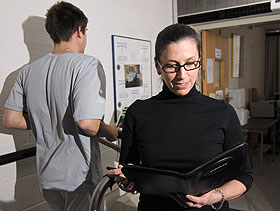  |
| HOME | THIS ISSUE | CALENDAR | GRANTS | BACK ISSUES | < BACK | NEXT > |
Sport nutrition expert receives award for contributions to field by Karen Singer - March 24, 2008
| ||||
| Nancy Rodriguez has built her career on the principle of real-life relevance. The approach is evident in her teaching style, which challenges students to test the theories they learn in class; and in her research, which she applies to her work with UConn’s athletic teams. Her accomplishments were recognized recently by the New England Chapter of the American College of Sports Medicine (NEACSM), which gave her its 2007 Honor Award. Rodriguez, an associate professor of nutritional sciences, has joint appointments in kinesiology and allied health sciences. She is also director of the Nutrition for Exercise and Sport Nutrition programs at UConn, coordinating sport nutrition services, developing education materials, and counseling student athletes. Over the past two decades, Rodriguez’s research has focused on the relationship between exercise and protein metabolism. She has received funding from the U.S. Department of Agriculture, and groups such as the American Egg Board and National Cattlemen’s Beef Association. Her most recent study looks at what happens when athletes eat fewer calories than they need around the time of an exercise bout or competition and, as a result, the body resorts to using protein as an energy source. “We are interested in how these brief periods of negative energy balance affect muscle protein use,” Rodriguez says. The study – involving 22 fit male and female students who run at least 30 miles a week and aren’t vegetarians – also examines whether a good source of protein, such as beef, is beneficial. One group ate a beef-based protein diet, the other a diet that provided protein from other sources. “We believe that since beef is an excellent source of the essential amino acid leucine – a nutrient that helps increase protein synthesis in muscle – it may offset any negative effect that consuming insufficient calories might have on protein use by the muscle,” she says.
“The bottom line,” Rodriguez says, “is you have to make sure you get enough calories to get the best use of dietary protein.” Her most recent published study, looking at how protein is metabolized when athletes consume small amounts of skim milk while running, shows that “when you have protein during a run, you break down less of the body’s protein,” she says, “theoretically improving protein use during recovery.” Rodriguez says 10 years ago, “most researchers in the field of endurance exercise did not see much use for this approach.” That has changed. Several months ago, for example, Cadbury Schweppes relaunched a sports nutrition drink with whey protein, touting its benefits to endurance athletic performance and recovery. Rodriguez soon will be investigating chocolate milk’s potential as a “recovery drink.” She also has a grant proposal pending with the American Institute of Cancer Research for a study probing how to limit protein breakdown and stimulate protein synthesis when people are in negative energy balance. “This might help find ways to improve the results of cancer therapy,” Rodriguez says. “Ultimately, if we can find what controls protein synthesis and breakdown in healthy people, perhaps we can find a way to help more people through appropriate nutrition interventions. “Athletes are a pretty small percentage of the people in this country,” she adds. “We have a ways to go before we can help other people with greater health and nutrition needs. Ultimately it would be great if my work made some useful contribution in those areas.” |
| ADVANCE HOME UCONN HOME |

